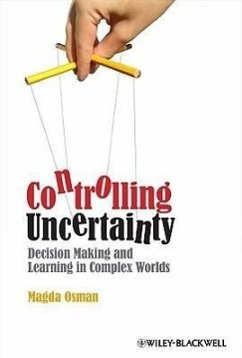One thing we can state with certainty is that we are surrounded by uncertainty. Yet in the midst of uncertainty, there are a host of complex realms where we are able to manage desirable outcomes: these include biological (personal fitness levels); economic (playing the stock market); ecological (growing crops); industrial (maintaining a nuclear power plant); mechanical (driving); and management (running a company). What is it about these particular domains that make them complex? And, more importantly, how do we make those decisions to ensure that we achieve the outcomes we desire? Controlling Uncertainty: Decision Making and Learning in Complex Worlds reviews and discusses the most current research relating to shaping our understanding of the ways we can control the uncertain world around us. The book presents an overview of precisely what it is that makes a situation uncertain by integrating key ideas from a variety of research disciplines - engineering, psychology, human factors, computer science, and neuroscience. Correspondingly, it also describes the behaviours and skills we develop to cope with challenging and demanding situations. Informed by the latest scholarship, Controlling Uncertainty offers illuminating insights into an exciting field of endeavor that is gaining in popularity just as our world grows ever more complex.
Hinweis: Dieser Artikel kann nur an eine deutsche Lieferadresse ausgeliefert werden.
Hinweis: Dieser Artikel kann nur an eine deutsche Lieferadresse ausgeliefert werden.
"The concepts are presented thoughtfully, clearly, and engagingly."(Booknews, 1 February 2011)
"Osman (experimental cognitive psychology, Queen Mary U.,England) brings key ideas from a variety of research disciplinestogether to review and examine current research on how people cancontrol the uncertainties around them." (Reference and ResearchBook News, February 2011)"A clear explanation and integration of complex system ideas inlayperson's language."
--Thomas B. Sheridan, Professor Emeritus, MassachusettsInstitute of Technology, US
'The control of complex dynamic tasks is a topic thatspans various and sundry cognitive and social sciences. Bringingunity to these studies has been hampered by differences in jargonand differences in paradigms. Magda Osman has turned herencyclopedic mind to this problem in an attempt to review thesediverse literatures from a common perspective. What she gains is atheoretical unity and purpose of vision that will advance thescientific study of the control of complex dynamic task for manyyears to come.'
--Professor Wayne D. Gray, Rensselaer PolytechnicInstitute, US
"Osman (experimental cognitive psychology, Queen Mary U.,England) brings key ideas from a variety of research disciplinestogether to review and examine current research on how people cancontrol the uncertainties around them." (Reference and ResearchBook News, February 2011)"A clear explanation and integration of complex system ideas inlayperson's language."
--Thomas B. Sheridan, Professor Emeritus, MassachusettsInstitute of Technology, US
'The control of complex dynamic tasks is a topic thatspans various and sundry cognitive and social sciences. Bringingunity to these studies has been hampered by differences in jargonand differences in paradigms. Magda Osman has turned herencyclopedic mind to this problem in an attempt to review thesediverse literatures from a common perspective. What she gains is atheoretical unity and purpose of vision that will advance thescientific study of the control of complex dynamic task for manyyears to come.'
--Professor Wayne D. Gray, Rensselaer PolytechnicInstitute, US








